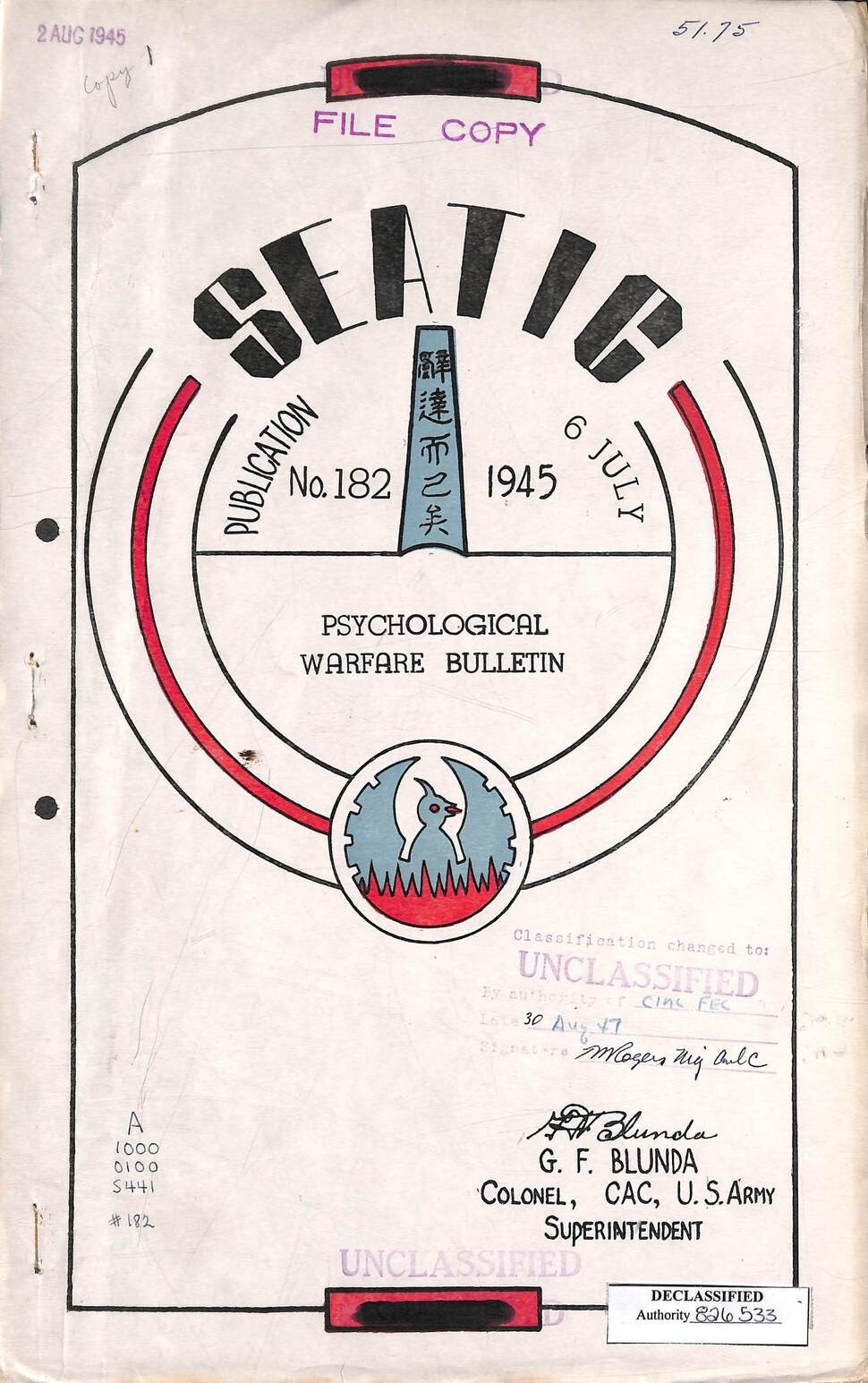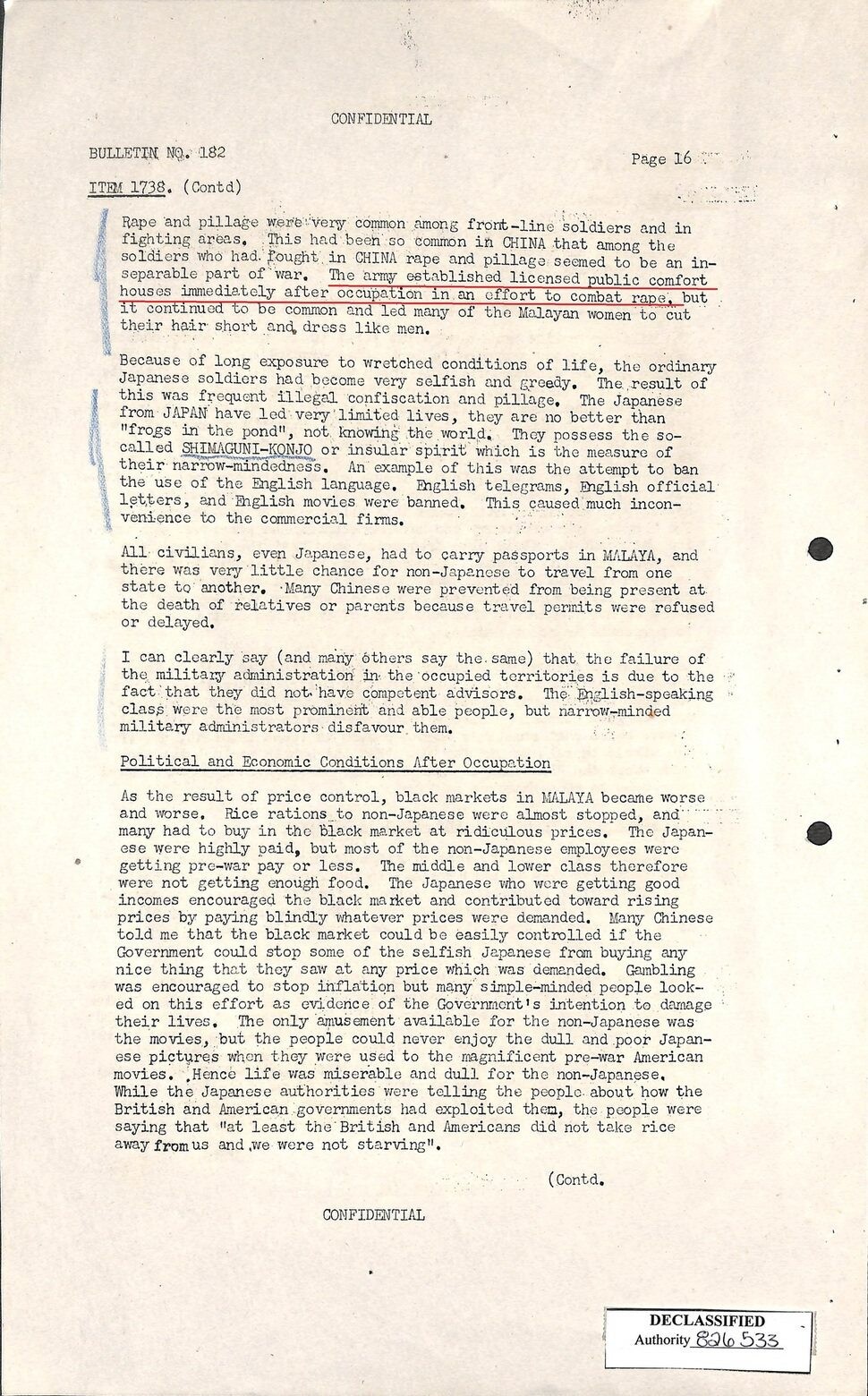hankyoreh
Links to other country sites 다른 나라 사이트 링크
Japanese military directly administered comfort stations, unearthed US documents show
New documents have surfaced showing the Japanese military was directly involved in the administration of “comfort women” and comfort houses in war zones.
The National Institute of Korean History (NIKH) revealed four documents on Aug. 11 that had been found at the US National Archives and Records Administration (NARA) as part of a project to collect and compile data on Japanese military comfort women and war crimes.

The first of the documents was Southeast Asia Translation and Interrogation Center Psychological Warfare Bulletin No. 182, published during World War II on July 6, 1945, by the US military.
“The [Japanese] army established licensed public comfort houses immediately after occupation in an effort to combat rape,” the document read (p. 16). On p. 18, the document claimed that some Japanese soldiers had raped young girls in villages.
While four pages of the bulletin had previously been released in a collection of data on comfort women published by Japan’s Asian Women’s Fund, the remaining 42 pages were newly discovered by NIKH.

The second set of documents were three reports from the interrogation of Japanese prisoners of war by the Allied Translator and Interpreter Section (ATIS). According to report No. 91, Japanese soldiers captured in Papua New Guinea said comfort houses had been “under army supervision.” In report No. 470, Japanese soldiers captured in Malang, Indonesia, claimed that seven comfort houses have been set up under military jurisdiction, with some 150 women employed there from Korea, Japan, and Indonesia. In report No. 652, Japanese POWs in the Philippines said Japanese military surgeons had conducted weekly examinations of the women to prevent sexually transmitted diseases.
The Japanese government has previously maintained that comfort women and comfort houses were administered by civilians rather than the military, although various documents discovered over the years have suggested direct Japanese military involvement.
“These materials confirm [the military’s] direct involvement all the more clearly and will serve as a basis for demanding legal responsibility and an official apology from the Japanese government,” NIKH said. The institute plans to begin publishing the materials it has assembled in sourcebook form later this year.
![provided on Aug. 11 by NIKH. “The [Japanese] army established licensed public comfort houses immediately after occupation in an effort to combat rape](https://flexible.img.hani.co.kr/flexible/normal/970/1597/imgdb/resize/2017/0814/150258693519_20170814.JPG)
By Choi Won-hyung, staff reporter
Please direct questions or comments to [english@hani.co.kr]

Editorial・opinion
![[Column] Life on our Trisolaris [Column] Life on our Trisolaris](https://flexible.img.hani.co.kr/flexible/normal/500/300/imgdb/original/2024/0505/4817148682278544.jpg) [Column] Life on our Trisolaris
[Column] Life on our Trisolaris![[Editorial] Penalties for airing allegations against Korea’s first lady endanger free press [Editorial] Penalties for airing allegations against Korea’s first lady endanger free press](https://flexible.img.hani.co.kr/flexible/normal/500/300/imgdb/original/2024/0502/1817146398095106.jpg) [Editorial] Penalties for airing allegations against Korea’s first lady endanger free press
[Editorial] Penalties for airing allegations against Korea’s first lady endanger free press- [Editorial] Yoon must halt procurement of SM-3 interceptor missiles
- [Guest essay] Maybe Korea’s rapid population decline is an opportunity, not a crisis
- [Column] Can Yoon steer diplomacy with Russia, China back on track?
- [Column] Season 2 of special prosecutor probe may be coming to Korea soon
- [Column] Park Geun-hye déjà vu in Yoon Suk-yeol
- [Editorial] New weight of N. Korea’s nuclear threats makes dialogue all the more urgent
- [Guest essay] The real reason Korea’s new right wants to dub Rhee a founding father
- [Column] ‘Choson’: Is it time we start referring to N. Korea in its own terms?
Most viewed articles
- 1New sex-ed guidelines forbid teaching about homosexuality
- 260% of young Koreans see no need to have kids after marriage
- 3[Column] Life on our Trisolaris
- 4OECD upgrades Korea’s growth forecast from 2.2% to 2.6%
- 5Presidential office warns of veto in response to opposition passing special counsel probe act
- 6Months and months of overdue wages are pushing migrant workers in Korea into debt
- 7[Guest essay] Maybe Korea’s rapid population decline is an opportunity, not a crisis
- 8Trump asks why US would defend Korea, hints at hiking Seoul’s defense cost burden
- 9[Editorial] Penalties for airing allegations against Korea’s first lady endanger free press
- 10Japan says it’s not pressuring Naver to sell Line, but Korean insiders say otherwise